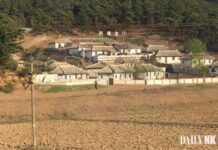The KPW-USD exchange rate has once again fallen into the mid- to high KPW 4,000 range. Falling expectations regarding trade as North Korean authorities strengthen quarantine measures along the Sino-North Korean border has apparently impacted the exchange rate.
As of Wednesday, the dollar rate was KPW 4,700 in Pyongyang, KPW 4,690 in Sinuiju, and KPW 4,620 in Hyesan. That represents a roughly 15% fall over 10 days when compared to Nov. 14, when the rate was KPW 5,500 in Pyongyang, KPW 5,500 in Sinuiju, and KPW 5,350 in Hyesan.
Since the closure of the border last year, North Korean exchange rates have fluctuated within 5% depending on expectations regarding trade. However, when the authorities take measures regarding trade or quarantine efforts, rates have tended to plummet more than 10%.
Daily NK has found that the Central Committee’s Organization and Guidance Department issued an order on Nov. 14 calling on the Central Emergency Anti-epidemic Headquarters, Ministry of State Security, and General Staff Department of the Korean People’s Army to strengthen quarantine rules along the Sino-North Korean border.
According to a high-ranking Daily NK source in North Korea, the order calls for strengthening border security during the winter and strict bans on drawing water from the Yalu River.
During the winter, local residents reportedly walk on the frozen river to the deep middle section, where they break the ice to draw water for use at home.
Last August, the Ministry of Social Security declared a buffer zone extending one or two kilometers from the “border closure line,” warning that people or animals that enter the zone in a disorganized way would be “unconditionally fired upon.”

However, even after the declaration, ordinary people living near the Yalu River, security guards of nearby schools and businesses and other individuals who received prior permission continued to go to the river to draw water.
This is because in certain border regions with poor waterwork facilities, you need to directly draw water from the river to secure water for daily use.
However, the North Korean authorities’ recent ban on drawing water from the Yalu River in winter appears largely aimed at preventing smuggling over the frozen river.
Smuggling activity usually increases in North Korea’s border regions in winter, when the rivers freeze. Even last winter, when North Korea closed the border and strengthened patrols, smuggling continued along the Yalu River.
With the latest order being relayed through the Central Emergency Anti-epidemic Headquarters, Ministry of State Security and General Staff Department to regional quarantine authorities, the border guard, the Seventh Corps and other organizations, it would seem expectations regarding the restart of trade were immediately put on hold as well.
North Koreans had hoped that trade restrictions would be relaxed around the time of the Lunar New Year, but that seems less likely to happen for now.
However, Daily NK confirmed that the RMB-KPW exchange rate fell less than the dollar rate. As of Wednesday, the yuan rate was KPW 587 in Pyongyang, KPW 595 in Sinuiju and KPW 600 in Hyesan, a fall of two to six percent from 10 days earlier.
Because most of the people who engage in official trade with trade certificates, or waku, use dollars, new quarantine measures that impact trade seemingly have an immediate effect on the dollar rate.
However, the authorities cannot completely eradicate smuggling despite tougher border controls, and moreover, smugglers along the border use yuan. Because of this, it appears the yuan rate fluctuates less dramatically.
The source said even now, smugglers along the border tend to use yuan, and that smuggling would continue one way or the other, no matter how the authorities close and enforce the border.
Please direct any comments or questions about this article to dailynkenglish@uni-media.net.

















